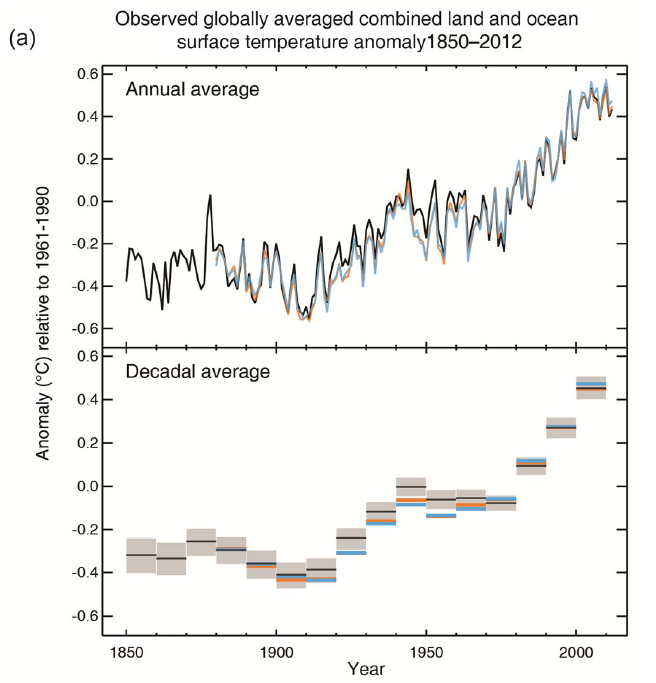We have often discussed issues related to science communication on this site, and the comment threads frequently return to the issue of advocacy, the role of scientists and the notion of responsibility. Some videos from the recent AGU meeting are starting to be uploaded to the AGU Youtube channel and, oddly, the first video of a talk is my Stephen Schneider lecture on what climate scientists should advocate for (though actually, it mostly about how science communicators should think about advocacy in general since the principles are applicable regardless of the subject area):
Archives for December 2013
The global temperature jigsaw
Since 1998 the global temperature has risen more slowly than before. Given the many explanations for colder temperatures discussed in the media and scientific literature (La Niña, heat uptake of the oceans, arctic data gap, etc.) one could jokingly ask why no new ice age is here yet. This fails to recognize, however, that the various ingredients are small and not simply additive. Here is a small overview and attempt to explain how the different pieces of the puzzle fit together.
Figure 1 The global near-surface temperatures (annual values at the top, decadal means at the bottom) in the three standard data sets HadCRUT4 (black), NOAA (orange) and NASA GISS (light blue). Graph: IPCC 2013. [Read more…] about The global temperature jigsaw
AGU 2013 preview and participation
So, it’s that time of year again.
Fall AGU is the largest Earth Science conference on the planet, and is where you will get previews of new science results, get a sense of what other experts think about current topics, and indulge in the more social side of being a scientist. The full scientific program is available for searching here.
In recent years, there has been an increasing amount of virtual content – including live streaming of key sessions and high profile lectures, and continuous twitter commentary (follow the hashtag #AGU13), that give people not attending to get a sense of what’s going on. Gavin and Mike are attending and will try and give some highlights as the week goes along, here and via twitter (follow @ClimateOfGavin and @MichaelEMann).
Some obvious highlights (that will be live-streamed) are the Frontiers of Geophysics lecture from the Jim Hansen (Tuesday, 12:30pm PST), Senator Olympia Snowe (Monday, 12:30pm), Judith Lean (Tues 10:20am), the Charney Lecture from Lenny Smith (Tues 11:20am), James Elsner on tornado connections to climate change (Tues 2:40pm), David Grinspoon (the Sagan lecture, Thurs 9am), and Bill Ruddiman (Thursday 2:40pm). Some full sessions will also be livestreamed – for instance, The future of IPCC session (Tues 10:20am-12:30pm), and the Climate Literacy sessions (Tues 4:00pm-6:00pm, Wed 8am-12:30pm).
For attendees, there are a number of events close to our hearts: A bloggers forum for discussion on science blogging (Mon 5pm), the Open Mic night hosted by Richard Alley (Mon 7:30pm at Jillian’s Restaurant), and the AGU 5k run on Wednesday morning (6:30am).
Also AGU and the Climate Science Legal Defense Fund have organised a facility for individual consultations with a lawyer (by appointment via lawyer@climatesciencedefensefund.org) for people either who have found themselves involved in legal proceedings associated with their science or people who are just interested in what they might need to be prepared for. There is a brown bag lunch session on Friday (12:30pm PST) for a more informal discussion of relevant issues.
There are obviously many individual presentations that will be of interest, but too many to list here. Feel free to add suggestions in the comments and look out for updates all next week.
A failure in communicating the impact of new findings
I was disappointed by the recent summary for policymakers (SPM) of the intergovernmental panel on climate change (IPCC) assessment report 5, now that I finally got around to read it. Not so much because of the science, but because the way it presented the science.
The report was written by top scientists, so what went wrong?
[Read more…] about A failure in communicating the impact of new findings

